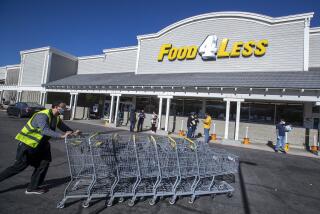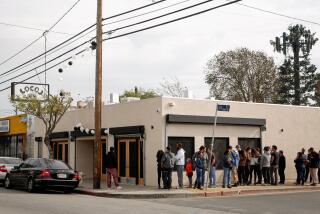New Leader at Kellogg’s Vows Quick Turnaround : Cereal: Company veteran Carlos Gutierrez has already shown that he’s not afraid to make hard decisions.
- Share via
BATTLE CREEK, Mich. — Four months into his job as Kellogg Co. chief executive, Carlos Gutierrez knows he’s not the most popular man in town.
In a community where the smell of cereal fills the air and generations of families have worked for the company that W.K. Kellogg founded 93 years ago, the cereal maker recently announced it is closing most of its aging, hometown plant.
The move will cost about 550 jobs in a city of nearly 54,000, but it will save the financially troubled company $35 million to $45 million a year.
Gutierrez says he’s only doing what’s best for Kellogg’s long-term survival. But some have accused the company of putting profits ahead of the family values that the company has historically championed.
The criticism hurts Gutierrez, a career Kellogg man who joined the company 24 years ago.
“I care very much about this company and community,” Gutierrez says. “These are painful but necessary decisions to make.”
*
Kellogg Co. is the world’s top manufacturer of ready-to-eat cereals and makes eight of the 10 most popular cereals in the world, including Frosted Flakes, Corn Flakes and Rice Krispies. Still, financial troubles are evident.
The company’s annual earnings dropped 21% last year. And though it reported a nearly 8% jump in its quarterly earnings on July 29, its stock price hovered at about $35 in late August, compared with $50 less than two years ago.
The company has been hurt by competition from store-brand cereals, as well as demographic changes. Fewer Americans are eating cereal in the morning, preferring foods like bagels, which can be eaten on the run.
And Gutierrez doesn’t hesitate to name Kellogg’s own mistakes: uninspired advertising and an insular corporate culture that discouraged people from speaking out about problems.
But the 45-year-old Gutierrez, the youngest chief executive in the company’s history, believes he’s prepared to overcome the problems.
“I think what the board wanted to see was leadership from someone who can really put the institution first,” he says. “They know I love this institution . . . but they also know I’ve demonstrated a willingness to change.”
*
Indeed, change came early for Gutierrez. The son of a Cuban pineapple plantation owner, he was 6 when Fidel Castro came to power and his family fled to Florida.
The family started over, but never regained the influence and wealth it had in Cuba.
Gutierrez went to work for Kellogg in 1975 as a sales representative in Mexico City.
Since then, he has been supervisor of Latin American marketing services, general manager of Kellogg de Mexico, president and chief executive of Kellogg Canada Inc., and president of Kellogg Asia-Pacific.
He returned to Michigan three years ago as an executive vice president of business development, and in June 1998 was named president and chief operating officer. He became chief executive this April.
Gutierrez says his Spanish-speaking skills and awareness of different cultures have come in handy in a company that distributes products in 160 countries. And while he’s proud of his Cuban roots, he says he’d rather be known for his accomplishments than as “the Hispanic CEO.”
His backers included retired Kellogg Chief Executive Bill LaMothe.
“His whole career has been one of many successes in almost any situation we threw him into,” says LaMothe, who led Kellogg from 1979 to 1991 and is now a board member. “He’s a tremendously hard worker.”
*
Kellogg’s backbone has been cereal.
But Gutierrez envisions a future for Kelloggs as a “healthy snack” company: where convenience foods like Rice Krispie Treats squares and Nutri-Grain Twist bars make up half the company’s sales by 2005.
Analysts like the double-digit growth Kellogg is seeing in its convenience foods, but caution against moving too quickly into unfamiliar territory, a concern that Gutierrez appears to share.
Shortly after taking the top job, he scaled back Kellogg’s cholesterol-fighting Ensemble, a line of cereal, pasta and cookies, saying it was inadequately test-marketed.
The future of Lender’s Bagels is also up in the air because the market for frozen bagels is flat.
“I like the fact he’s willing to try some things and not take it personally,” says John McMillin, a Prudential analyst. “The past management would have let Ensemble go for two years.”
But analysts question whether Gutierrez will be able to accomplish his goal this year.
“They’re trying to resurrect the brand and the ready-to-eat cereal category after almost a decade of poor performance,” says David Nelson of CS Boston. “I think it’s possible for Kellogg to return to a level of growth but . . . any turnaround is going to take a while.”
Even LaMothe, the former Kellogg chairman, isn’t sure Gutierrez can make good on his goal.
“I think in looking at the whole situation, a year might be too soon to call for double-digit earnings,” he says.
*
Even before Gutierrez became CEO, Kellogg was changing.
In December, the company cut more than 500 white-collar jobs in its North American division as part of a reorganization, while raising U.S. cereal prices nearly 3%.
In June, two months after taking charge, Gutierrez proposed closing the South Plant, the largest part of the company’s historic Battle Creek factory, on the grounds it was outdated and inefficient. He finalized the decision in August.
“This is probably one of those decisions that should have been made years ago,” says Michigan Economic Development Corp. President Doug Rothwell.
Gutierrez says Kellogg must make profitable innovation its priority.
He plans the release of two dozen new Kellogg products between January 1999 and January 2001.
More to Read
Inside the business of entertainment
The Wide Shot brings you news, analysis and insights on everything from streaming wars to production — and what it all means for the future.
You may occasionally receive promotional content from the Los Angeles Times.








